English : Unit 4 : Prose : The Attic
Glossary
bifurcated (v) – divided into two
revive (v) – to bring something back to life
soothing(v) – making someone feel calm
rustic (adj.) – typical of the countryside
dilated (v) – widened than usual ascertained (v) – confirmed
overwrought (adj.) – state of being upset
attic (n) – the space or room at the top ofa building, under the roof
crumbled (v) – broken
spire (n) – a tall, pointed structure on topof a building, especially on top of a church tower
unperturbed (adj.) – undisturbed affluent (adj.) – wealthy
smacks (v) – drive or put forcefully intoor on to something
WHILE READING QUESTIONS:
a. When did Aditya leave the local school?
Aditya left the local school after he had passed the matriculation examination.
b. Why did Aditya think that the school would not be recognisable?
Aditya was going to visit the school after twenty nine years. The school may have undergone many changes in these years. So he thought that the school would not be recognizable.
c. Who were Aditya’s ancestors?
• Aditya’s ancestors were zamindars.
d. How was the landscape through which they travelled?
The landscape was spotted with paddy fields on either side of the road.
e. What did Aditya visit?
Aditya visited his old school. Later he visited Nagen uncle’s tea shop, his old house, jeweller’s shop and the house of Jogesh Kabiraj.
f. Where was Nagen uncle’s shop?
Nagen uncle’s shop was next to a grocery shop and opposite to Lord Shiva’s temple.
g. Besides tea, what did Nagen uncle have in his shop?
Besides tea, Nagen uncle had biscuits and savouries in his shop.
h. What did Nagen uncle tell about Sanyal?
Nagen uncle told that Sanyal could not hear and see well and he had no money to buv spectacles.
i. In what way was Mr. Sanyal’s behaviour strange?
Mr. Sanyal suddenly stood up, stretched himself and raised his lean right arm. With eyes dilated, he began to recite the poem ‘Panraksha’ (‘Keeping of a Promise’) by Tagore. In this way, his behaviour was strange.
j. What did Nagen uncle tell about Sanyal’s past life?
Nagen uncle told that Sanyal led a cursed life. He had sold his lands for ‘m daughter’s marriage and lost his wife and only soft the year before.
k. How did Sanyal show that he had a sense of self-respect?Sanyal showed his sense of self respect by paying money for his tea and biscuits in the tea shop.
l ) Why was the attic 4a favourite place’ for the children?
The attic was a favourite place for the children because they seem to be in a world or their own.
m) What did Aditya do on reaching the attic?
On reaching the attic, Aditya pushed his hand inside the ventilator and searched for something(the medal).
l. What did the jeweller say about the article?
The jeweller said that the article was an antique.
o) Was Sanyal happy about his visitors?
No. Sanyal was not happy about his visitors.
p) Why did Sanyal recite the poem in the tea shop earlier?
Sanyal recited the poem so that Aditya could remember and recognize him and feel his mistake.
q) What was engraved on the medal?
The words ‘Sriman Sasanka Sanyal – Special Prize for Recitation -1948’ was clear? engraved on the medal.
A. Answer the following questions in two or three sentences.
1. Write a few lines about the owner of the shop.
The owner of the tea shop was over sixty. He was rustic in appearance with white neatly combed hair and clean look. He was wearing a dhoti and a blue striped shir* under a green shawl.
2. What was the daily routine of Sanyal?
Sanyal went to the tea shop and had tea and biscuits there. He never failed to pay for them. This was the daily routine of Sanyal.
3. Why was there a sudden change in Aditya’s expression?
When Sanyal recited the poem, Aditya could recognise that the man was Sanyal whom he had deceived a long time ago. He felt his mistake. So there was a sudden change in his expression.
4. Why did Aditya decide to visit his ancestral home?
Initially, Aditya decided to visit his ancestral home trying to revive his old childhood memories. After seeing Sanyal, he decided to go there to get the medal he once stole from Sanyal.
5. What was the condition of the attic?
The wall of the attic had crumbled down. In the whole house, the attic had been the worst hit by wind and weather. The floor was strewn with twigs, straw and pigeon droppings.
6. When did Aditya heave a sigh of relief? Why?
When Aditya had got the medal in the attic, he heaved a sigh of relief. Twenty nine years ago, Aditya had stolen it from Sanyal and kept it in the attic. Now he felt guilty and wanted to return it to Sanyal. It was safe till then.
7. Why did Aditya and his friend go to the jeweller?
Aditya and his friend went to the jeweller to find out the weight of Sanyal’s medal. They wanted to know the value so that Aditya could pay Sanyal the money for the medal.
8. What did Aditya offer Sanyal?
Aditya offered Sanyal a sum of one hundred and fifty rupees.
9. “Your grievances are absolutely justified.” Who says this to whom? Why?
Aditya says to Sanyal, “Your grievances are absolutely justified.” Aditya felt guilty of stealing Sanyal’s medal. So he justified Sanyal’s anger and grievance.
B. Answer in detail the following questions in about 100-150 words.
1. Give a detailed account of all thoughts and questions in the narrator’s mind while accompanying Aditya from the tea shop to Sanyal’s house?
Prose : THE ATTIC
Author : Satyajit Ray
Theme : Thoughts and questions in the narrator’s mind
Characters : Aditya, Narrator, Nagen uncle and Sanyal
Outline : Narrator’s visit to Aditya’s home town – Meet with Sanyal – Aditya’s expression – Aditya’s relief – Answers to the narrator’s questions.
The narrator and Aditya had visited Aditya’s village after twenty nine years. They went to Nagen uncle’s tea shop. They met Sasanka Sanyal there. Sanyal suddenly stood up and began to recite the poem ‘Panraksha’ by Tagore. The narrator doubted that Sanyal was a little crazy. And also, he could notice a sudden change in Aditya’s expression, while hearing Sanyal’s recitation. So he asked Aditya the reason for it, to which he didn’t answer. Aditya inquired Nagen about Sanyal. On their way to go to meet Sanyal again, Aditya expressed his wish to visit his old house. The .narrator asked him whether he really wanted to visit his house. In his house, the narrator witnessed Aditya heaving a sigh of relief, when he had got a medal in the attic. Not knowing the fact, the narrator eagerly asked the reason for it. Aditya did not answer him there as well. Later they went to the jeweller to find out the weight of the medal. The narrator could not understood why Aditya behaved like that. They went to Kabiraj’s house, where Sanyal stayed. Aditya confessed Sanyal for his act of stealing his medal which he got for recitation. Only then, the narrator knew the answers for all the questions in his mind.
ESSAY
• Introduction
• Narrator’s doubt about Sanyal
• Narrator’s observation
• Narrator’s confusion
• Answers to the narrator’s questions
• Conclusion
Introduction:
In the story ‘The Attic’, the narrator and Aditya went to visit Aditya’s village after twenty nine years. While accompanying Adilya from the tea shop to Sanyal’s house, the narrator had lot of thoughts and questions regarding Aditya’s behaviour. Let us see them in detail.
Narrator’s doubt about Sanyal:
They met Sasanka Sanyal in the Nagen uncle’s tea shop. Sanyal suddenly stood up and began to recite the.poem ‘Panraksha’ by Tagore. The narrator doubted that Sanyal was a little crazy.
Narrator’s observation:
The narrator could notice a sudden change in Aditya’s expression, while hearing Sanyal’s recitation. So he asked Aditya the reason for it to which he didn’t answer. Adithya inquired Nagen about Sanyal.
Narrator’s confusion:
On their way to meet Sanyal again, Aditya expressed his wish to visit his old house. The narrator asked him whether he really wanted to visit his house. In his house, the narrator witnessed Aditya heaving a sigh of relief, when he had got a medal in the attic. Not knowing the fact, the narrator eagerly asked the reason for it. Aditya did not answer him there as well.
Answers to the narrator’s questions:
Later they went to the jeweller to find out the weight of the medal. The narrator could not understood why Aditya behaved like that. They went to Kabiraj’s house where Sanyal stayed. Aditya confessed Sanyal for his act of stealing his medal which he got for recitation.
Conclusion:
Only then, the narrator knew the answers for all the questions in his mind.
Moral: Some times questions are complicated, and answers are simple.
2. ‘Man does change with time’-What were the various changes that came about in Aditya?
Prose : THE ATTIC
Author : Satyajit Ray
Theme : Man does change with time
Characters : Aditya, Narrator, Nagen uncle and Sanyal
Prose outline : Aditya’s visit to his home town – Aditya met Sanyal – Aditya’s expression – Twenty nine years ago – Sanyal’s anger – Aditya’s change
Aditya and the narrator went to visit Aditya’s village after twenty nine years. They went to Nagen uncle’s tea shop. They met Sasanka Sanyal there. On seeing them, Sanyal began to recite the poem ‘Panraksha’ by Tagore. Aditya inquired Nagen about Sanyal. He could recognise that the man was Sanyal who he had deceived a long time ago. So there was a sudden change in his expression. He felt his guilt. Once Aditya was jealous of Sanyal, when Sanyal got a medal for recitation of Tagore’s poem. Then Aditya took the medal from Sanyal to show his father and never returned it. When Sanyal demanded his medal, Aditya replied that he had missed it. Aditya remembered all these. But Sanyal got angry with Aditya. Aditya justified Sanyal’s anger and grievance, since he committed the mistake. Now he wanted to prove that he was not the same as he had been earlier. He said to Sanyal that man changes with time. Aditya too changed and realized his mistake. So he gave Sanyal the cost of the medal one hundred and fifty rupees. As Sanyal refused, Aditya handed over the silver medal to him and proved that he has changed with time.
ESSAY
• Introduction
• Narrator’s visit to Aditya’s home town
• Meet with Sanyal
• Aditya’s expression
• Twenty nine years ago
• Sanyal’s anger
• Aditya’s change
Introduction:
In the story ‘The Attic’, the narrator and Aditya went to visit Aditya’s village after twenty nine years. Let us see how time changes Aditya to realise and repay his mistake.
Aditya’s visit to his home town
The narrator and Aditya went to visit Aditya’s village after twenty nine years. They went to Nagen uncle’s tea shop.
Aditya met Sanyal:
They met Sasanka Sanyal there. On seeing them, Sanyal began to recite the poem Panraksha by Tagore with eyes dilated. Aditya inquired Nagen about Sanyal.
Aditya’s expression:
Aditya was stunned. He could recognise that the man was Sanyal whom he had deceived a long time ago. So there was a sudden change in his expression. He felt guilty.
Twenty nine years ago:
Once Aditya was jealous of Sanyal, when Sanyal got a medal for recitation of a poem. Aditya took the medal from Sanyal to show his father and never returned, it to Sanyal. When Sanyal demanded his medal, Aditya replied that there was a hole in his pocket and it had fallen through it. Aditya remembered everything.
Sanyal’s anger:
But Sanyal got angry with Aditya. Aditya justified Sanyal’s anger and grievance, since he committed the mistake.
Aditya’s change:
Now he wanted to prove that he was not the same as he had been earlier. He said to Sanyal that man changes with time. Aditya too changed and realized his mistake. So he gave Sanyal the cost of the medal one hundred and fifty rupees. As Sanyal refused, Aditya handed over the silver medal to him and proved that he.has changed with time.
Conclusion:
In course of time, people change. Here, in this story, Aditya had undergone a change and determined to return the silver medal to Mr. Sanyal.
Moral: Time changes and we change with them.
3. Give a brief character sketch of Sasanka Sanyal.
Prose : THE ATTIC
Author : Satyajit Ray
Theme : Character sketch of Sasanka Sanyal
Characters : Aditya, Narrator, Nagen uncle and Sanyal
Prose outline : Author Introduction – Sanyal’s life – Sanyal’s self respect.- Sanyal’s recognition – Sanyal’s innocence – Sanyal’s self esteem
Sasanka Sanyal led a cursed life, He sold his lands and his house for his daughter’s marriage. He lost his wife and only son the year before. He was forced to stay in Jogesh Kabiraj’s house who was his father’s friend. In spite of his suffering, he showed his sense of self respect by paying money for his tea and biscuits in the tea shop. He recognised Aditya at the tea shop itself. He recited the poem for which he got the medal. He recited it so that Aditya could remember and recognize him. He could not forgive Aditya, who never returned the silver medal. Sanyal became helpless due to old age and poverty. He was a man of innocence who expressed his grievances politely. He admitted that he got angry at the tea shop. Finally he acknowledged that he could not control his anger and behaved indifferently. He did not accept the money for his medal from Aditya. He frankly asked Aditya that he Wanted his medal back. For him, the silver medal and the recognition were more valuable than anything else. Though Sanyal suffered a lot, he proved that he had an acute sense of self-respect.
ESSAY
• Introduction
• Sanyal’s life
• Sanyal’s self respect
• Sanyal’s remeniscences
• Sanyal’s innocence
• Sanyal’s dignity
• Conclusion
Introduction:
In the story ‘The Attic’, the narrator pictured the genuine character of a poor village man Sasanka Sanyal. Let us see it.
Sanyal’s life:
Sasanka Sanyal led a cursed life. He sold his lands and his house for his daughter’s marriage. He lost his wife and only son the year before. He was forced to stay in Jogesh Kabiraj’s house who was his father’s friend.
Sanyal’s self respect:
Sanyal showed his sense of self respect by paying money for his tea and biscuits in the tea shop.
Sanyal’s remeniscences :
He has not forgotten the unpleasant incidents of the past. He recognised Aditya at the tea shop and recited the poem that he recited on the prize-giving day. He recited it so that Aditya could remember and recognize him. He could not forgive. Aditya who never returned the silver medal.
Sanyal’s innocence:
Sanya! became helpless due to old age and poverty. He was a man of innocence who expressed his grievances politely. He admitted that he got angry at the tea shop. Finally he acknowledged that he could not control his anger and behaved indifferently.
Sanyal’s dignity’:
He did not accept the money for his medal from Aditya. He frankly asked Aditya that he wanted his medal back. For him, the silver medal and the recognition were more valuable than anything else. ‘
Conclusion:
Thougn Sanyal suffered a lot, he proved that he had an acute sense of self-respect.
Moral: Self-respect is the root of discipline.
Vocabulary
Compound Words
Read these sentences:
1. Beyond the iron gates were the playing field and the two-storeyed school building.
2. The owner of the tea shop, now over sixty, a little rustic in appearance, with his white neatly-combed hair and clean look, was the same as before.
3. His nerves seemed overwrought for some reason.
The words in italics are Compound words. A compound word is a combination of two or more words that function as a single unit of meaning.
C. Complete the following table with two more compound words.
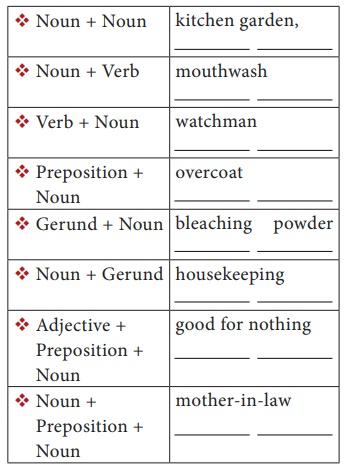
❖ Noun + Noun : kitchen garden, school bus, table spoon
❖ Noun + Verb : mouthwash, sunset, pen stand
❖ Verb + Noun : watchman, playground, call taxi
❖ Preposition + Noun : overcoat, underworld, upstream
❖ Gerund + Noun : bleaching powder, walking stick, dining hall
❖ Noun + Gerund : housekeeping, birdwatching, babysitting
❖ Adjective+ Preposition + Noun : good for nothing, lack of food, free of cost
❖ Noun + Preposition + Noun : mother-in-law, line-by-line, day-to-day
D. Combine the words in column A with those in column B to form compound words as many as you can.
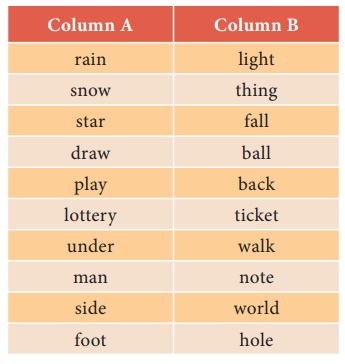
Answer
rainfall
snowball / snowfall
starlight
drawback
plaything / playback
lottery ticket
underworld
manhole
sidewalk/ backside
footnote
E. Form compound words from the boxes given below and fill in the blanks in the sentences that follow with the appropriate compound words.
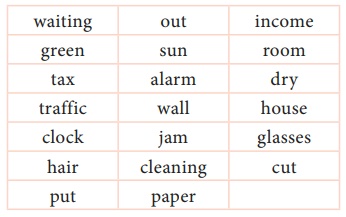
1. Siva visited the hair stylist to have a clean haircut.
2. Tharani had given the sarees for dry cleaning.
3. The green house is a natural process that warms the earth’s surface.
4. Never wait for an alarm clock to wake you up.
5. The children were late to school as there was a traffic jam near the toll plaza.
6. The government expects every individual to promptly pay the income tax.
7. People usually wear sun glasses during summer.
8. The patients were asked to sit in the waiting room until the doctor arrived.
9. With teamwork we are able to multiply our output.
10. The room was looking bright with the colourful wallpaper.
AFFIXES
Read the following line taken from the text:
In the English language, new words can be formed by a process called affixation. Affixation means adding affixes to the root word to form a new word. Affixes can be classified into prefix and suffix. If an affix is attached to the beginning of a word, it is called a Prefix. If an affix is attached to the end of the word, it is called a Suffix.
Exampels:
Prefixes:
illiterate, disqualify, supernatural, suburban, malnutrition.
Suffixes:
childhood , ability, examination , establishment, slavish.
F (i) Form new words by adding appropriate prefix/suffix:
1. accurate inaccurate, accuracy
2. understand misunderstand, understanding
3. practice practical, impractical, malpractice
4. technology technologist, technological
5. fashion fashionable, fashionate
6. different indifferent, difference , differentiate
7. child childish , childhood , childlike
8. national nationally , nationality , international
9. origin originally, originality , originate
10. enjoy enjoyment, enjoyable
(ii) Frame sentences of your own using any five newly formed words.
1. Raja misunderstood me for a lawyer.
2. Stephen is a well-known computer technologist.
3. We never forget our childhood days.
4. Wipro is an international company.
5. Reading books is an enjoyable hobby.
G Fill in the blanks by adding appropriate prefix/suffix to the words given in brackets.
1. He was sleeping comfortably in his couch. (comfort)
2. Kavya rides a bicycle to school. (cycle)
3. There was only a handful of people in the theatre.(hand)
4. It is illegal to cut sandalwood trees.(legai)
5. The arrival of the President has been expected for the last half an hour.(arrive)
6. The man behaved abnormally in front of the crowd. (normal)
7. Swathy had no intention of visiting the doctor. (intend)
8. The bacteria are so small that you need a microscope to see them. (scope)
Grammar
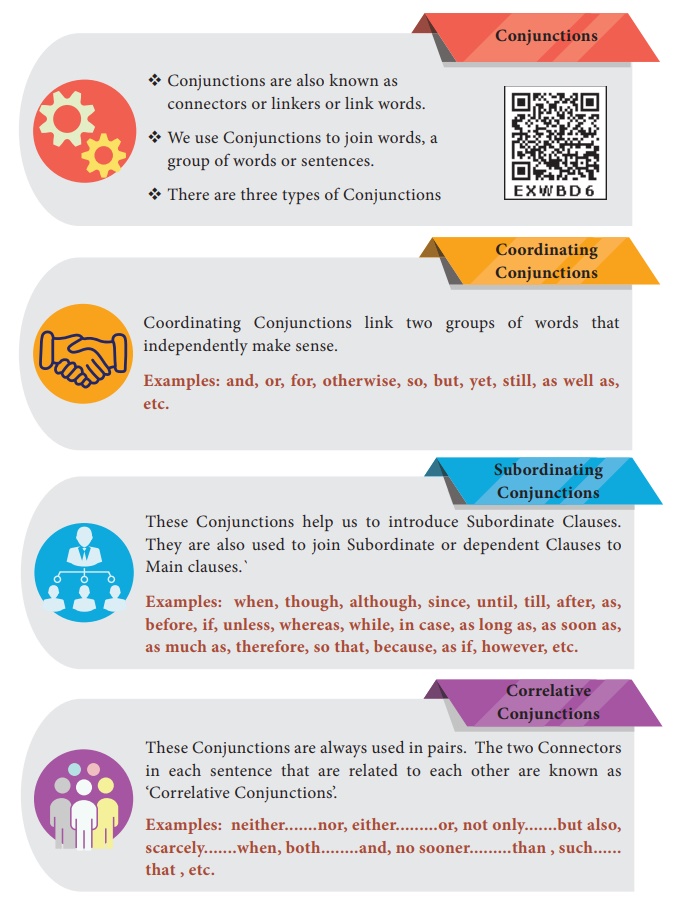
Conjunctions And Their Functions
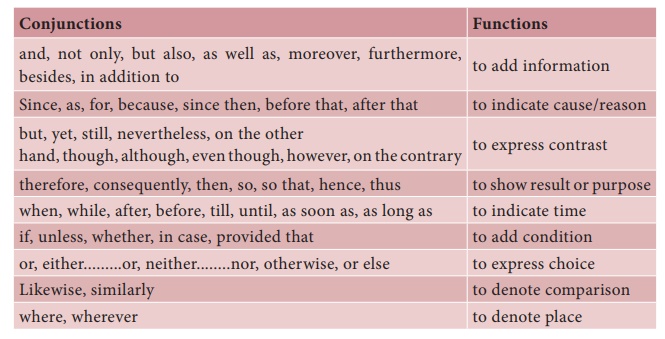
Now, let us see various types of Conjunctions and practise how to use them in sentences.
I. Coordinating Conjunctions:
1. I rang up but he didn’t speak to me.
2. Slow and steady wins the race.
3. Finish your work or you will not be sent home.
4. The child was ill so he was admitted in the hospital.
5. He is rich for he is hard-working.

II. Subordinating Conjunctions:
1. Unless you work hard, you cannot secure good marks.
2. Wait till I return.
3. He is honest, though he is poor.
4. As John is very weak, he is not able to walk fast.
5. I will return home after sunset.
6. My uncle entered my house, while I was doing my homework.

III. Correlative Conjunctions:
1. Sheeba is both a singer and a dancer.
2. Neither Jane nor Ram has attended the function.
3. No sooner did the teacher enter the class than the boys stood up.
4. Scarcely had they gone out when it started raining.
5. The car is not only economical but also feels good to drive.

EXERCISE:
A. Complete the sentences given below choosing the right connectors given in brackets.
1. Call me in case you need money. (so that, in order that, in case)
2. I forgot that I had to meet the Principal. (whether, that, if)
3. Though he is ninety years old, he is in the pink of health. (when, since, though)
4. It is raining. Take an umbrella or else you will get drenched. (or else, and, but)
5. They faced many hardships nevertheless they are always cheerful. (although, nevertheless, otherwise)
B. Fill in the blanks with the connector that goes with the underlined words.
1. Both the minister and the officers visited the affected areas.
2. Jaya teaches not only English but also Science.
3. Either Raghu or Bala will have to buy vegetables from the market.
4. No sooner did I enter the house than it started drizzling.
C. Combine the pairs of sentences using appropriate connectors.
1. We came late. We did not miss the train.
–Though we came late, we did not miss the train.
2. They checked the packet twice. Then they sealed it.
They checked the packet twice and then they sealed it.
3. Sita saw a snake. At once she ran away.
As soon as Sita saw a snake, she ran away, (or)
Sita saw a snake and at once she ran away.
4. Robert completed the project. He submitted it to the teacher.
Robert completed the project and submitted it to the teacher.
5. Yusuf was running high temperature. He could not take part in the competition.
As Yusuf was running high temperature, he could not take part in the competition,
(or) Yusuf was running high temperature and so he could not take part in the competition.
D. Tick the correct linker.
1. Though he was honest, he was punished.
though,but
2. Walk carefully otherwise you will fall down.
unless, otherwise
3. My mother called me while I was playing football.
or, while
4. My salary is low nevertheless I find the work interesting.
Nevertheless, similarly
5. The passengers rushed to board the bus as soon as it arrived.
as soon as,as long as
E. Supply suitable linkers.
1. “When I was alive and had a human heart, ” answered the statue, “I did not know what tears were, for I lived in the palace where sorrow was not allowed to enter. My courtiers called me the Happy Prince and Happy Indeed I was. So I lived and so I died.
2. Many writers make incorrect sentences when they try to put sentences together. They may make grammatical errors and leave out important punctuation marks. Making such mistakes is quite common while preparing the first draft . So he must carefully edit his final draft.
3. In most large cities and towns of our country, there are special schools for girls. Moreover / And also, there are many co-educational schools where girls and boys study together. Most parents allow their daughters to attend these schools, but there are some parents who are against such schools for girls after the age of 14 or 15.
F. Rearrange the words in the correct order to make meaningful sentences.
1. as / I / healthy / are / you / am / as
I am as healthy as you are.
2. your / today / put on / new / since / is / birthday /dress / the
Since today is your birthday, put on the new dress.
3. allergic / dogs / Rani / though / is / to / of / six / she / them / has
Though Rani is allergic to dogs, she has six of them.
4. speaks / Ruben / besides / German / languages / two
Ruben speaks two languages besides German.
5. loan/apply/you/if/for/you/a/get/will/immediately/it/
If you apply for a loan, you will get it immediately.
Nominalisation
The term “nominalisation” refers to he process of producing a noun from another part of speech by adding a derivational affix.
A grammatical expression is turned into a noun phrase when we nominalise a sentence. For example,
(A) After 1885, trade with Europe grew. (Verb)
(B) After 1885, there was a growth in trade with Europe. (Noun)
In sentence B, we have used the word ‘growth’ which is the noun form of the verb ‘grow’ by adding the suffix ‘th’.
Nominalisation can be done in three different ways.
1. We can add suffixes like -ment, -tion, -sion, -ness, -ation, -ity, -al to verbs and adjectives.
Examples:
admire – admiration
arrive – arrival
careless – carelessness
fail – failure
include – inclusion
intense – intensity
punish – punishment
2. Some words are turned into nouns without any adding suffix.
Examples:
bleed – blood
lose – loss
prove – proof
sell – sale
speak – speech
3. Some words do not undergo any change when they are used as nouns.
Examples:
attempt – attempt
change – change
control – control
desire – desire
escape – escape
G. Write the noun forms of the following words.
1. beautiful 2. breathe 3. enter 4. know 5. deafen 6. zealous 7. familiar 8. accept 9. dangerous
Word : Noun forms
1. beautiful : beauty
2. breathe : breath
3. enter : entry
4. know : knowledge
5. deafen : deaf
6. zealous : zeal
7. familiar : familiarity
8. accept : acceptance
9. dangerous : danger
More examples:
We have learnt how we derive noun forms from verbs and adjectives. Now, let us transform complete sentences by converting verbs and adjectives into nouns. In this process, we nominalise them, without changing the meaning of the given sentences.
1. He decided to turn down her request.
He made a decision to turn down her request.
2. The team members reviewed the matter. It helped them solve the problem.
The review of the matter by the team members helped them solve the problem.
H. Complete the following sentences using the noun form of the words given in brackets
1. The boy had to give a proper explanation for being late. (explain)
2. They could make prediction about the future.(predict)
3. At one point in life, he had no choice but to trust his friend. (choose)
4. The monuments are to be preserved because of their historical significance. (significant)
5. It is very difficult to work with so many distractions.(distract)
I. Rewrite the sentences nominalising the underlined words. The first one has been done for you.
Ex: Students work diligently to score well in exams.
Students work with diligence to score well in exams.
1. We succeeded in our attempt.
We got success in our attempt.
2. Nalini leads a happy life.
Nalini has happiness in her life.
3. She failed and it disappointed her.
Her failure gave her disappointment.
4. India became an independent country in the year 1947.
India got independence in the year 1947.
5. The child resembles her father.
The child has a resemblance to her father.
J. Combine the pairs of sentences given below into a single sentence using the noun form of the highlighted words.
1. He is an honest person. Everyone likes him.
Answer: Everyone likes him for his honesty.
2. Sathya gave an explanation. The police wanted her to prove it.
Answer: Though Sathya gave an explanation, the police wanted the proof.
3. He speaks well. It attracts all.
Answer: His speech is an attraction to all.
4. Suresh is always punctual and regular. It has earned him a good job.
Answer: Punctuality and regularity of Suresh have earned him a good job.
5. The policeman arrived quickly. It made us happy.
Answer: The quick arrival of the policeman made us happy.
K. Complete the sentences in the paragraph using the appropriate form of words given in brackets.
1. My sister wanted to go to Mumbai last week. She made a decision (decide) to buy a ticket at once. As reservation (reserve) could be done online, she gave preference (prefer) to book a ticket that way. First, she collected information (inform) about the arrival (arrive) and departure (depart) of trains and airplanes.
2. A few days later, Androcles was captured by his master. He had to suffer all kinds of punishment (punish). At last, he was thrown to a lion which was in great hunger (hungry).It had been kept in an enclosure (enclose) and had not been fed for several days. His friends stood there with tearfull (tear) eyes as the lion rushed towards him. The lion stopped near him and stood for a while looking (look) at him. Then it lay down by his side like a pet dog. Obviously (obvious), the lion recognized Androcles and the help (help) he had given it.
Phrases and Clauses
Finite And Non-Finite Verbs:
Words which denote an action are known as verbs. We classify verbs into two types. They are
1. Finite verbs:
a. My brother goes to temple daily.
b. We have already finished the project.
The words printed in bold letters are finite verbs.
1. Finite verbs indicate the tense and time of actions.
2. Finite verbs undergo a change as and when the Subject (number or person) changes.
2. Non-Finite Verbs:
1. Non-finite verbs do not indicate the tense and time of actions.
2. Non-finite verbs do not change even when the Subject (number or person) changes.
There are three kinds of non-finite verbs.
1. An infinitive ( to + verb )
2. A gerund ( verb + ing )
3. A participle
Example:
a. My son likes to watch cricket matches.(Infinitive)
b. Playing chess is my hobby. (Gerund)
c. Driven out of the kingdom, the king hid himself in a forest. (Participle)
PHRASE:
Example 1:
an intelligent boy
a costly pen
an interesting story
The above group of words are known as phrases. It doesn’t contain a finite verb.
A Phrase is a group of words without a finite verb
CLAUSE:
Example 1:
a boy who is intelligent
a pen which is costly
a story which is interesting
The groups of words given above are clauses
A Clause is a group of words which consists of a finite verb.
More Examples:
Example 1:
Having completed the work, the boy went out to play.
The underlined part of the sentence, doesn’t contain a Finite verb. This group of words is a Phrase.
Example 1:
After the boy had completed the work, he went out to play.
The underlined part of the sentence contains a finite verb. Hence, we call it a clause.
Kinds Of Phrases:
We have three kinds of phrases according to their functions in sentences.
1. Adjective Phrase: It is a group of words that does the work of an adjective. It describes the noun.
Example 1:
We bought chairs made of wood for our auditorium.
2. Adverb Phrase: It is a phrase which functions as an adverb. This Phrase supplies some information about the action.
Example 1:
When the patient was taken to the Emergency ward, the doctors rushed there in a hurried manner.
3. Noun Phrase: This is a phrase which acts as a noun.
Example 1:
A boy of class X became the house captain.
L. Identify the phrases in the following sentences and classify them as Adjective, Adverb or Noun phrases.
1. The girl in blue saree is my sister. – Adjective phrase
2. Kohli hopes to win the trophy. – Noun phrase
3. The train halts at every junction. – Adverb phrase
4. I have never seen such a picture. – Noun phrases
5. She worked in an enthusiastic manner. – Adverb phrases
Kinds Of Clauses
1. Adverb Clause: It modifies the verb, that is, it tells something about the action. This Clause gives details about the action.
Example:
The students were sitting quietly in the classroom until the teacher arrived.
(The highlighted part of the sentence speaks about the time of the action)
2. Noun Clause: This clause functions as a noun.
Example:
Whoever wins the contest will get a prize.
(The highlighted portion acts as a noun here)
3. Adjective Clause: It acts as an adjective and describes a noun.
Example:
I went to the place where I was born.
(The highlighted words describes the place)
M. Identify the clauses and classify them accordingly.
1. Ram bought a pen that doesn’t write well. – Adjective clause
2. Come back as soon as possible. – Adverb phrase
3. Most of her friends whom she had invited attended her wedding. – Noun clause
4. My brother visits my father whenever he comes to Chennai. – Adverb clause
5. Call me in case there is an emergency. – Adverb clause
6. Until the sun sets, the old woman cannot step out of her house. – Adverb clause
7. She knows where I go. – Noun clause
8. You can go wherever you want. – Adverb clause
Listening
Listen to the procedure to book on-line tickets carefully and fill in the blanks that follow. Listen to the recording twice.
N. Fill in the blanks :
1. Log into your irctc account.
2. Fill in the information asked to you in Book your ticket section.
3. The starting point and destination of your journey must also be selected.
4. List of available trains will appear.
5. You must check on the check availability and fare for the train of your choice.
6. Your personal details like name, date of birth, berth preference, mobile number, any valid ID proof and e-mail are a must.
7. After filling information and captcha click on continue booking.
8. You can make the payment either by credit card/ debit card or e-wallets.
Speaking
Mock Press Conference:
Mock Press Conference is an event wherein the participants would pose as public figures ranging from writers to scientists, politicians to singers, sports personalities to film stars. They speak, hear and raise questions. It is a tool used to generate news, specially news that appear in print or electronic media which is prominent and relevant.
With the help of your teacher organise a mock press conference . The following steps will help you in organizing a Mock Press Conference.
1. Decide on who is going to hold the press conference.
2. Plan the date , time and venue.
3. Select and train the participants.
While addressing the conference……
* Be clear and concise
* Avoid using rhetoric, or non verbal expressions like ‘hmmm’ ‘ah’ etc.
* You can use expressions like ……
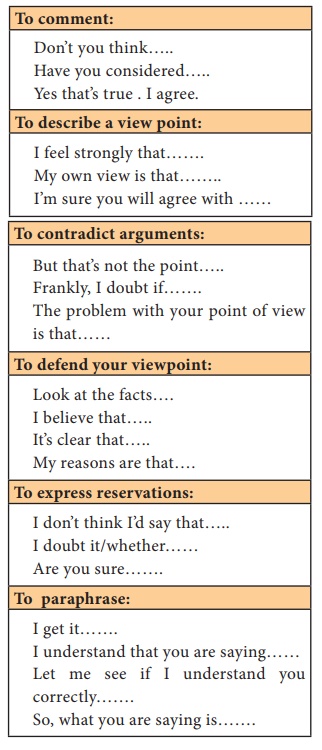
To comment:
Don’t you think…..
Have you considered…..
Yes that’s true . I agree.
To describe a view point:
I feel strongly that…….
My own view is that……..
I’m sure you will agree with ……
To contradict arguments:
But that’s not the point…..
Frankly, I doubt if…….
The problem with your point of view is that……
To defend your viewpoint:
Look at the facts….
I believe that…..
It’s clear that…..
My reasons are that….
To express reservations:
I don’t think I’d say that…..
I doubt it/whether……
Are you sure…….
To paraphrase:
I get it…….
I understand that you are saying……
Let me see if I understand you correctly…….
So, what you are saying is…….
O. Given below are the various personalities from different fields. The topic of discussions is also given. Take roles and conduct a Mock Press Conference.
i. Mr. Anand Tony, director of the award winning movie ‘Poo’, is meeting the press. Take turns to be the director and media persons. Conduct a perfect discussion.
Director : Welcome to our press conference. The movie ‘Poo’ has won many awards nationally and internationally with your support.
Media person 1 : I feel strongly that portraying women in good light has won recognition in our society. Do you think Mari’s love last even after her marriage?
Director : I believe that the love of Maari for Thangarasu is pure and true. Moreover, she wants to visit Thangarasu at the village festival even after her marriage.
Media person 2 : The problem with your point of view is that she loves Thangarasu instead of her husband Karuppasamy.
Director : Look at the facts that she loves Thangarasu and wants to many him. But for Tharg arasu’s happ iness, she is ready to sacrifice her.
Media person 3 : Are you sure that she loves Thangarasu whole-heartedly?
Director : Certainly. It’s clear that she loves him. That’s why she tells her mother frankly that she wants to meet Thangarasu at the village festival.
Media person 4 : So, what you are saying is that, the heroine is honest to her husband.
Director : My own view is that the awards are. for the honesty and innocence of the heroine.
Media person 5 : Yes. that’s true. I agree.
Director : Thank you.
ii. Ms. Pavithra Rao, the squash player who won the gold medal at the recent Asian Games , is holding a press conference . Let the discussion focus more on the strategies that helped her to win.
Ms.Pavithra Rao : Welcome to our press conference. Feel free to interact with me.
Media person 1 : What would be the foremost strategy for your success in the Asian Games?
Ms.Pavithra Rao : Varying speed and direction of the serve is the most important strategy. Media person3 : So, what you are saying is that, varying speed and direction of the serve plays a vital role in winning the medal.
Ms.Pavithra Rao : Definitely. It’s clear from the examples in the past. Successful squash players followed the strategies, to win.
Media person4 : Don’t you think that varying the pace of the shots to reduce predictability is helpful while playing?
Ms. Pavithra Rao : I feel strongly that the presence of mind and skilful strategies are significant.
Media person5 : Have you considered any other tactics in the game?
Ms.Pavithra Rao : I don’t think I’d say that a particular skill alone is enough. So be focused, confident, & practice regularly to grab your success. Thank you.
iii. GL Home Appliances have introduced a product to purify salt water. The CEO of the company has agreed to meet the press to launch their new product.
CEO : Welcome to our press conference. GL Home Appliances have introduced a product to purify salt water. GL Home Appliances have satisfied the customers so far. Hope it would satisfy now too.
Media person 1 : No doubt. GL Home Appliances has reached out to the people of all kinds in cities. Have you considered the rural area and the affordability of the people?
CEO : Of course. Our new product to purify salt water is user-friendly and cost- effective. I am sure people will love to use it.
Media person2 : But that’s not the point. All may not be comfortable to use it unless you show a demo of the product.
CEO : Look at the facts and feedbacks of the people who have already used it. Definitely. It’s clear that feedbacks from the users are supportive to thrive on our business.
Media person4 : I doubt if there was any difference from other brands.
CEO : Strikingly differences range from design to capacity and cost of the product.
Media person5 : I get it. Your product goes well w ith the taste of the customers.
CEO : My own view is that the product fulfils the needs of people.
Media person6 : So, what you are saying is true and right.
Reading
Read the following letter from a parent to her son’s coach and answer the questions given below:
Dear coach,
Thanks for the special gifts that you have given to my child. You learned his name and spoke it often. You taught him the basics of the sport as well as special ways to improve and excel. Although you had a whole team of kids to mentor, you took time for individual instruction where needed.
Under your care, I have watched him transform from a timid, doubting child to a strong, happy player willing to give all for the team. Throughout the season when he gave his best, even though it was not quite enough to gain that extra point, you recognised his contribution with a pat on the back and encouraging words.
Your wise approach showed him that, although winning is a goal, there are other goals just as worthy. He learned the value of finishing what he started and joy of personal accomplishment. These attributes carried him through a season that was full of hard work and fun, discouragement and resolve, defeat and victory.
And at the very end, at the championship meet when he brought home his first place medal, you were among those who were so very proud of how far he had come. It is a victory to all of us. What amazes me is you’ve taught them skills that will last a lifetime. You’ve kindled in them a desire to excel. The medals, trophies and ribbons are all symbols of real gifts. These most certainly have had to come straight from your heart.
With appreciation,
A parent.
P. Answer the following questions:
1. What did the coach teach the child?
The coach taught him the basics of the sport as well as special ways to improve and excel.
2. What values did the child learn?
The child learnt the value of finishing what he started and the joy of personal accomplishment.
3. The parents noticed some changes in the child. What were they?
The child changed from a timid, doubting player to a strong, happy player willing to give all for the team.
4. Read the letter again and write a few lines on each of the following:
a. things that the coach taught….
things that the coach taught were the basics of the sport as well as special ways to improve and excel.
b. transformation in the child……..
transformation in the child was from doubting child to a strong happy player willing to give all for the team.
c. things that amazed the writer……..
things that amazed the writer were the skills taught by the coach would last a lifetime.
5. Find sentences /words from the text which express the following:
a. The parent’s earlier view of the child- timid and doubting child.
b. One of the qualities of the teacher- Individual attention and wise approach.
c. Words related to prize- medals, trophies and ribbons.
Writing
NOTICE: A notice is a formal means of communication. The purpose of a notice is to announce or display information to a specific group of people. Notices are generally meant to be pinned up on specific display boards in schools or in public places.
How to write a notice:
1. The name of the school or the institution must be prominent It should be clear, legible and in CAPITAL letters.
2. The name of the program for which the notice is drafted should be highlighted.
3. The date of drafting the notice, must be written on the top left/right corner of the box.
4. You can start the notice by using expressions like……
· This is to inform all the students…..
· All the students are informed…..
5. You must include details such as …….
· What/when/why/where/for whom is the programme…
· Date of registration, last date….
6. The final sentence can be…
· For further information, details contact…..
· For further details contact………
· Contact the undersigned person….
Sample 1.
You are Nikil/Nikitha, school pupil leader of GHSS, Trichy. Prepare a notice on behalf of your school inviting the grandparents of the students to celebrate World Elders’ Day in your school auditorium on the 20th of next month.

Q. Prepare notice for the following
i. You are the school monitor, of Modern Matriculation School, Villupuram. Your school Principal has requested you to inform the students about a trip to Yercaud for 3 days. Prepare a notice giving the details such as date of journey, mode of transportation, amount , dress code etc.
NOTICE
MODERN MATRICULATION SCHOOL, VILLUPURAM
TRIP TO YERCAUD
16 November 2019
All the students are informed that our school management has arranged for a trip to Yercaud for three days. Interested students are requested to pay Rs.500 on or before 20 November 2019. Our school bus will start at 8.00 a.m on 25 November 2019.
Please bring casuals and sweaters.
Kamal/Kamala
School Monitor
ii. You are the Secretary of Park Circus Residents Welfare Association. Write a notice to inform the residents of your colony of a Meditation program under the guidance of Dr. P. Ranjit with a view to understanding the self better. The program is exclusively for the residents It will be conducted on the second Saturday of the following month from 7.00 a.m. to 9.00 a.m. at the children’s park nearby .
NOTICE
Park Circus Residents Welfare Association
Meditation Program
17 November 2019
This is to inform all residents of our colony that there will be a meditation program under the guidance of Dr. P. Ranjit for understanding the self better. The program will be conducted on the second Saturday of the following month from 7.00 a.m to 9.00 a.m at the nearby children’s park.
Kumar
Secretary
iii. You are Ganesh/Gayathri Head boy/ Head girl, of your school. Write a notice for your school notice board informing the students about the ‘Fancy Fete’ that is going to be organised in your school campus on the 10th of next month.
NOTICE
ST. JOSEPH’S COLLEGE HR. SEC. SCHOOL, TRICHY
FANCY FETE
21 N ovember 2019.
Our school is going to organise ‘Fancy Fete’ for all our students on 10th December 2019. All students are invited to attend the function in our school auditorium at 3.00p.m. Interested students can enroll their names to participate in the competitions on or before 25th November 2019.
Ganesh/Gayathri
Head boy/Head girl
Article writing
Article writing is the process of creating non-fictitious text about current or recent news. It can be items of general interests or specific topics. They are published in print forms, such as newspapers and magazines. Article writing is a skill that needs to be practised.
Steps involved in writing an article:
1. Decide the theme:
Choose an interesting, relevant or a current issue.
2. Decide the title:
The title suggests the core idea of the article. It has to be brief and captivating, kindling the interest of the readers.
3. Form an outline:
Forming an outline of the article is very essential. It can be done in three steps:
*Introduction
*Body
*Conclusion
4. Draft the content:
When your outline is complete start expanding on the title.
5. Edit it:
Never submit an article in its first draft. Revise the article until it expresses your thoughts completely. Give it a final reading. Edit it and correct the errors.
6. Final Reading:
Once the article is edited, give it a final read. Check if it adheres to the requirements.
Sample:
The following is an article by Arjun / Anjana on the causes and effects of pollution.
Pollution a major concern
-By Arjun / Anjana
Pollution is a major issue in India. Anything added into the environment that results in producing harmful or poisonous effect on living things is called pollution. It is one of the considerable issues for the whole world. It is a kind of impurity in natural environment that is harmful for all the living beings on earth. Pollution whether it is air, land, noise or water always has adverse effects.
India is the world’s largest consumer of fuel wood, agricultural waste and biomass for energy purposes, which releases millions of tonnes of pollutants into the air every year. Vehicle emissions, another source of air pollution, get worsened by fuel adulteration and poor fuel combustion efficiencies from traffic congestion. Factories pollute air through fossil fuel emissions. These emissions include carbon dioxide, methane and nitrous oxide.
Air pollution is the main cause for the monsoon to be delayed. Air pollution is the major cause for several health hazards. It damages vegetation and animal life too.
Steps must be taken to clean smokestacks and exhaust pipes in factories. Vehicles must be checked periodically and maintained meticulously. We can opt for renewable or alternative energy sources. Using such renewable and sustainable energy sources reduces pollution. Creating awareness is the remedial measure to check pollution.
We as responsible citizens, must willingly contribute to the reduction of air pollution. Ecological issues are an integral part of environmental issues that challenges India. So it is high time we take stringent steps to stop pollution that affect us. It’s time for action.
R. Write an article for the follow
i. You are Jansi/Avinash of Class X studying in GHSS, Chengalpet. You believe that physical activities improve our health and reduce the risk of sickness. It has got immediate and long term benefits. Write an article in not more than 150-200 words for your school magazine stressing the importance of physical activities in a students day to day life.
A Sound Mind in a Sound Body
– By Jansi/Avin?xsh
Class X
The proverb A Sound Mind in a Sound Body insists on both healthy body and stable mind. A person’s health is a combination of physical, mental and social well being. A healthy body is essential for a healthy mind. First and foremost, everyone should be health¬conscious. Good health is ensured by a balanced, diet and good exercise. Balanced diet supports our body avoiding excessive fats, minerals, salts, etc. Physical activity or exercise enhances our health and provides us happiness. T’he second asset of a well composed person is mental health. Cognitive functions are ensured by the stability of one’s mind. Yoga is invariably advisable to be a mentally balanced person. It enhances and reinforces concentration and attention at a task in hand..
Both physically and mentally stable persons possess a positive attitude towards life. They become socially responsible, individually productive and globally connected. They are constructive, creative, optimistic, and innovative throughout their life. The world is in need of such people. To sum up, physically strong people possess mental health and are sociable. Hence, all people must be health conscious and avoid all sorts of diseases that are the fruits of idleness and sluggishness.
ii. The service provided by the conservancy workers in your city is very poor. You find all the street corners dumped with garbage thrown by the residents of the locality. It causes a menace for the public at large. You are Ramya/Rajan of Class X, studying in TM Model School, Dharmapuri. Write an article in about 150-200 words to the editor of The Indian Express, about this and suggest ways by which the situation could be improved .
Cleanliness is Next to Godliness
– By Ramya/Rajan
Class X
TM Model School, Dharmapuri
The proverb ‘Cleanliness is Next to Godliness’ indicates that cleanliness leads to the health of humanity. Maintaining cleanliness provides hygiene and good health to the people. Every one is responsible for such a noble task. Residential areas are to be strictly kept clean whereas in our city heaps of garbage are found in the densely populated areas. Unclean and untidy streets cause health hazards to the inhabitants. Undeniably, vendors dispose off the waste wherever they set up a business. Residents of the city dump the waste on bins. Dogs and cattle squatter upon the waste and consume it. Garbage is hazardous to one’s health and the surroundings.
Hospitals, schools and industries become the target of such nuisance in our city. Pedestrian’s throw litter along the streets and roads. People, young and old defecate on roads and streets polluting the environment. The mounds of garbage near schools and hospitals pose a great threat to the health of the residents. Nauseating stench all over the city is a menace to the well being of the city dwellers. Heaps of garbage, lying around remain uncleared for w,eeks. They are the breeding place for mosquitoes that cause diseases such as Dengue fever, Malaria, Hepatitis, Dysentery and Typhoid
Grievances have been submitted to the officers. Government’s apathy in maintaining congested traffic, controlling dust pollution and fixing filthy potholes is intolerable. Increasing garbage leads to environmental degradation and it also affects our health. To fight against the worsening conditions, regular clearance of garbage is necessaiy. The city administration must pump men and machines into action. Cleanliness Awareness programmers should be organized in the city. More men and women should be employed to carry out the task. I sincerely, request your intervention to keep the city clean and green.
iii. Recently while returning home from school you were knocked down by a speeding motorcycle. You escaped with minor injuries. You are Kishore/ Kavitha of class XI, studying in GHSS, Coimbatore. Write an article to The Hindu, in about 150-200 words expressing your concern about the increasing number of road accidents due to reckless driving. Also stress the importance of following traffic rules.
Importance of Road Safety Rules
~ By Ki shore/ Kavitha
Class XI
GHSS, Coimbatore.
Accidents have become a day-to-day affair. Whether on national highways or city roads, most of the accidents are either due to reckless driving or negligence of road safety rules. Besides, the increase in the number of vehicles causes traffic jam. It is to be regulated. Road safety and accidents are crucial issues of today. Almost every day people face accidents, sometimes causing death. In spite of observing road safety, every year, people are ignorant of the rules and impatient while driving. Most of the accidents are caused due to reckless driving. Impatient, negligent drivers overlook the safety rules and speed up their vehicles causing confusion in the traffic.
Highway drivers drive as fast as they can, assuming no hurdles on their way. Rail roads, bypass roads, bordering villages are dangerous due to the cattle crossing. To avoid accidents, immense attention is required while driving. Drivers Lind pedestrians should strictly follow the safety rules in order to avoid deadly accidents. Safety rules, awareness programmes should be organised at school and college levels. Each panchayat, municipality and city corporation should spread road safety awareness among people. Importance of wearing helmets and seatbelts must be emphasized. Road safety rules should be displayed along the roads as reminders. Let us all join together and spread awareness about road accidents and the importance of following road safety rules to save humanity.














